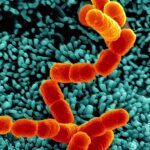Link to Pubmed [PMID] – 8602116
Life Sci. 1996;58(10):833-8
Diabetes is known to alter the myosin phenotype of striated muscle, but the impact of the same diabetic state on different types of striated muscles remains unknown. Therefore, this study determined the myosin isoenzyme profile in the left ventricle, soleus, plantaris, and extensor digitorium longus (EDL) of young male rats made moderately diabetic with streptozotocin, (45 mg/kg, ip). Eight weeks after the single streptozotocin injection, tissues were collected and subsequently electrophoretically analyzed for native myosin isoenzyme distribution. Skeletal muscles were additionally analyzed for myosin heavy chain distribution. Neither the native myosin isoform nor the myosin heavy chain (MHC) distribution profiles of the skeletal muscles were altered by the diabetic state. In contrast, the high ATPase cardiac isoform, VI, was significantly replaced by the low ATPase isoform, V3 (p < 0.05). These results demonstrate that striated muscle responds to a moderate diabetic state in a limited and muscle specific fashion. Significantly, the change in the cardiac myosin isoform profile is comparable to that which occurs in a more severe diabetic state.

